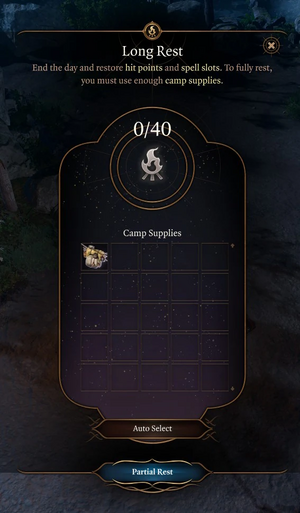Ad placeholder
Resting
Resting is a gameplay mechanic used to restore lost hit points and depleted resources.
Rests can be either long or short. Long rests restore all lost hit points and spent resources, whereas short rests restore a limited amount of hit points, and a smaller variety of resources.
Long rest
Long rests are primarily taken at camp and restore the following:
- All hit points
- All spell slots
- All resources
- Use of certain item actions
- Illithid power dialogue options
Partial rest
Taking a long rest passes the night, and costs 40 (80 in tactician or honour difficulty) camp supplies. If the party lacks the required supplies, they may instead take a partial rest, which restores the following:
- Restore hit points up to half of their maximum.
- Restore resources up to half of the character's maximum, rounded down.
- This includes class-specific resources such as spell slots,
 Ki Points, and
Ki Points, and  Superiority Dice.
Superiority Dice.
- This includes class-specific resources such as spell slots,
- Refreshes cooldowns, including items, and class features like Song of Rest or Portent and most illithid powers.
- Luck of the Far Realms is not restored as it costs a hidden resource you only have a max one of, which gets rounded down to 0.
Short rests are not restored when performing a partial long rest while the Bard's Song of Rest ability does.
Many origin, companion and camp follower interactions will occur when long resting. Long rests can also advance certain time-sensitive content.
Consequences of long resting
If the party has taken on time sensitive quests, those will progress by long resting, sometimes with terrible outcomes; for example, if taking a long rest right after starting , Mirkon will be killed by the Harpies.
Each act will have a handful of quests that will advance if the player long rests.Short rest
Twice per long rest, the party can take a short rest, which restores the following:
- Hit points up to half of their maximum (rounded down)
- Uses of weapon actions
- Bards of level 5 or higher regain their Bardic Inspiration charges
- Clerics regain their Channel Divinity charges
- Druids regain their Wild Shapes
- Fighters regain the use of their Action Surge and Second Wind abilities, and their Superiority Dice
- Monks regain their Ki
- Paladins regain their Channel Oath charge
- Warlock spell slots
- The following Illithid Powers: Psionic Overload, Force Tunnel, Stage Fright, Repulsor, Shield of Thralls, Black Hole, Absorb Intellect, and Fracture Psyche
Note that characters that are not in the active party do not benefit from short rests; they do not regain hit points or resources.
Additional Types
There are additional features ingame which function similarly to taking a rest;
- The level 2 Bard feature functions identically to a short rest.
 Potion of Angelic Reprieve functions as a short rest (in addition to recovering all expended
Potion of Angelic Reprieve functions as a short rest (in addition to recovering all expended  and
and  Spell Slots), if the character consuming it is left asleep, uninterrupted, for 2 turns.
Spell Slots), if the character consuming it is left asleep, uninterrupted, for 2 turns. Potion of Angelic Slumber functions as a long rest, if the character consuming it is left asleep, uninterrupted, for 2 turns.
Potion of Angelic Slumber functions as a long rest, if the character consuming it is left asleep, uninterrupted, for 2 turns.- restores the party as if they took a long rest, revives any downed party members, and can even be used in combat. However, any form of Divine Intervention can only be used once per character in the entire game.
- Using a Restoration Pod found aboard the Nautiloid in the prologue or the Mindflayer colony in Act Two, or the boudoir in the House of Hope in Act Three will restore the party as if they took a long rest, without ending relevant effects like or Elixirs.
